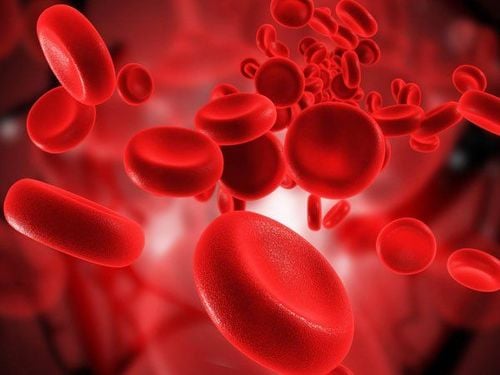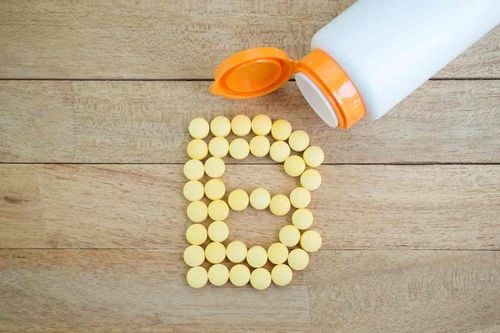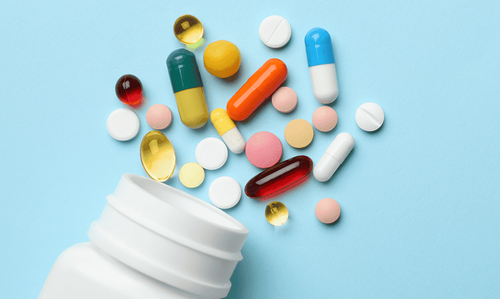This is an automatically translated article.
Have you ever wondered why doctors always tell you that you need to eat a balanced diet? The reason is that the building blocks of good health come from a variety of foods. For example, B vitamins, an important factor in maintaining cell health and keeping you full of energy.
1. Symptoms of vitamin B deficiency
Not all B vitamins have the same function. Besides, different types of B vitamins come from different foods. For example, vitamin B-12 is found mainly in meat and dairy products, and B-7 and B-9 are found in fruits and vegetables.
Deficiency of any of the B vitamins can lead to health problems. In some cases, your doctor will prescribe a vitamin B supplement for you when you are diagnosed with a vitamin B deficiency.
Some people, such as the elderly and pregnant women, need some absorption. B vitamins in higher concentrations. Some health conditions, such as Crohn's disease, Celiac disease, HIV and alcohol abuse can lead to poor absorption of B vitamins.
Symptoms caused by vitamin B deficiency depend on the type of B vitamin that you lack. Signs can range from fatigue and dementia to anemia or a compromised immune system. Skin rashes may also occur.
Below is a list of the most common B vitamins and the effects of vitamin deficiencies.
1.1 Vitamin B-12 Vitamin B12 (cobalamin) helps regulate the nervous system. It also plays a role in red blood cell growth and formation.
Vitamin B-12 is found mainly in meat and dairy products, so anyone following a strict vegan diet is at risk for a deficiency. Supplements are the main source of vitamin B12 for vegans.
Some good food sources of vitamin B-12 include:
Eggs Cheese (one serving is the size of a domino) A glass of milk Fish Shellfish Liver Kidney Red Meat
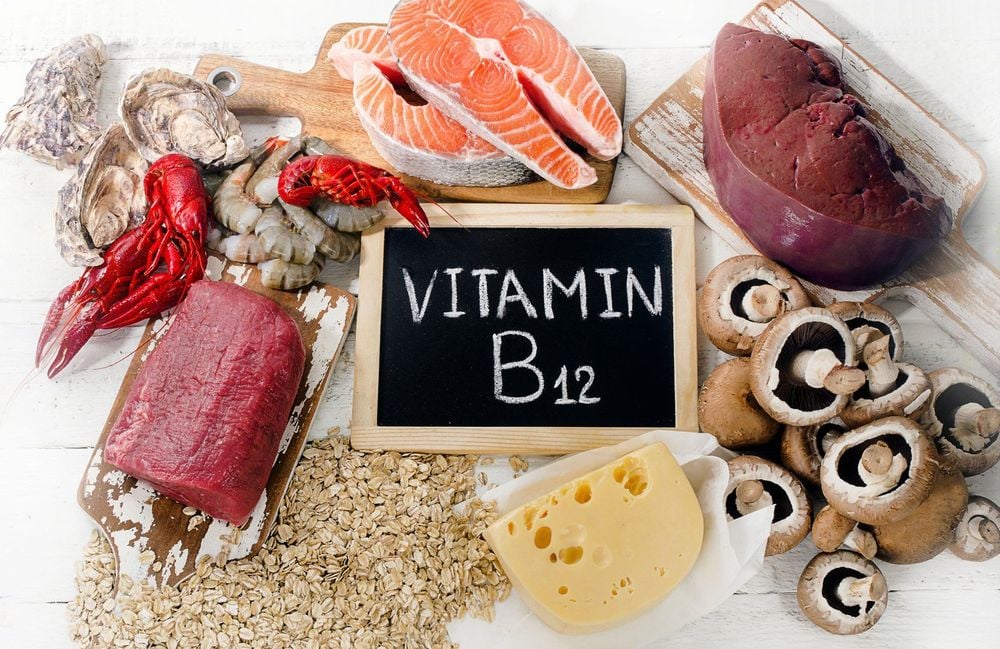
Một số thực phẩm chứa nhiều vitamin B12
Vitamin B-12 deficiency can lead to anemia and confusion in older adults.
Psychological conditions such as dementia, paranoia, depression and behavioral changes can be caused by vitamin B-12 deficiency. Nerve damage is sometimes irreversible.
Vitamin B-12 deficiency can cause the following symptoms:
Tingling in the feet and hands Irritability or depression Fatigue 1.2 Vitamin B6 Vitamin B6 (pyridoxine) helps the body turn food into energy. It can also help the body fight infections. Pregnant and breastfeeding women need vitamin B6 to help their baby's brain develop normally.
Vitamin B-6 can be found in:
Green beans Tuna Salmon Whole grains and cereals Beef liver Ground beef Chicken breast Watermelon Potatoes Spinach Insufficient amounts of B-6 can lead to deficiency blood as well as skin disorders, such as rashes or cracks around the mouth. A lack of B-6 can also cause:
Depression Confusion Nausea Anemia Ease of infection Skin rash ( dermatitis ) 1.3 Vitamins B-1 and B-2 Vitamins B1 and B2 help convert food into energy. Vitamin B-1 has benefits for the nervous system, and vitamin B-2 helps maintain proper vision.
Vitamins B1 and B2 can be found in
Cereals Milk Eggs Dark green vegetables A deficiency of vitamins B1 and B2 usually does not cause problems. This is due to the fact that many foods contain these vitamins, such as milk and whole grains. However, people who abuse alcohol may experience vitamin B1 and B2 deficiencies.
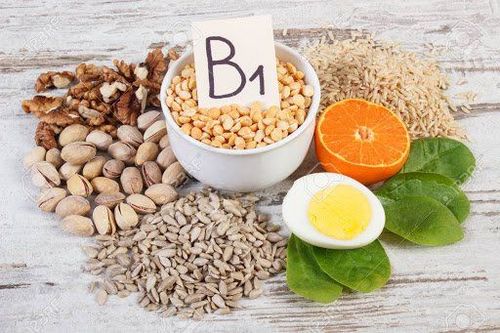
Vitamin B1 có nhiều trong ngũ cốc nguyên hạt
1.4 Vitamin B-3 Vitamin B3 (niacin) also helps convert food into energy, in addition to supporting good digestion and stimulating a healthy appetite.
Vitamin B3 is found in:
Chicken Fish Liver Red meat Whole grains, such as wheat and barley Peanuts A lack of niacin can cause digestive problems, such as nausea and vomiting. stomach cramps. Severe deficiency can also cause psychosis.
1.5 Vitamin B-9 Vitamin B-9 is also known as folate or folic acid. Folate is found naturally in foods. Folic acid is the synthetic form, commonly found in processed foods. Like most B vitamins, B-9 promotes the growth of red blood cells. It also reduces the risk of birth defects during pregnancy.
Vitamin B-9 can be found in:
Meat Grains Beets Citrus Fruits Fish Cereals Legumes Green leafy vegetables Liver and kidneys Not getting enough folate, you may have diarrhea or a deficiency blood. Pregnant women with folate deficiency can give birth to babies with birth defects. However, too much folic acid during pregnancy can also lead to neurological problems for the newborn.
If you experience any of these symptoms, you should tell your doctor right away for a prompt examination.
Although you may have a vitamin B deficiency, the symptoms can also be a sign of a health problem.
2. Prevent vitamin B deficiency
Most people don't need to take supplements to get all the B vitamins their body needs. There is a wide variety of delicious foods available that can include all the nutrients you need, as long as you maintain a diet full of meats, whole grains, fruits and vegetables.
Sometimes over-the-counter supplements are used to prevent deficiency. Vitamin supplements should only be taken on the advice of a doctor. If you're pregnant or over 50, you're more likely to need to take a supplement.
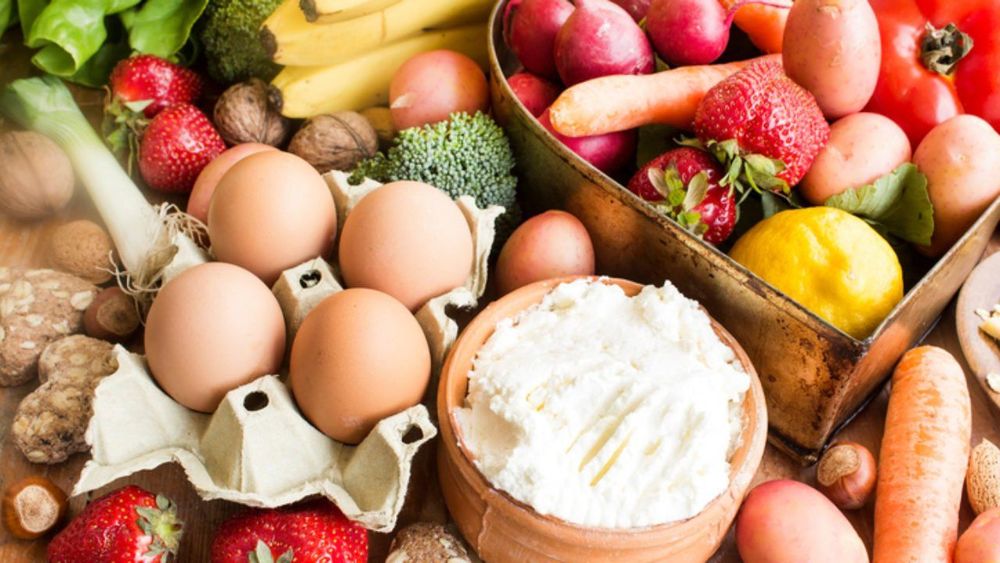
Thực phẩm chứa nhiều vitamin B tốt cho sức khỏe
Also, supplements are only a last resort if you cannot get B vitamins through your diet, or if you have a medical condition that warrants their use. The risk of supplemental overdose is lower than with other nutrients because B vitamins are water-soluble. However, supplements can still cause side effects or long-term health effects, or interact with medications you take.
If you suspect you may have a vitamin B deficiency, contact your doctor for an accurate diagnosis.
Lots of foods contain B vitamins, making it easy to get enough B vitamins from your diet. It is best to get B vitamins from a variety of food sources. This helps ensure you get enough of the B vitamins.
You can find B vitamins in:
Milk Cheese Eggs Liver Kidney Meat, such as chicken and red meat Fish, such as tuna, fish Mackerel and salmon Shellfish, such as oysters and clams Dark green vegetables, such as spinach and kale Vegetables, such as turnips, avocados, and potatoes Whole grains and cereals Beans, such as beans kidney, black beans and chickpeas Nuts and seeds Fruits, such as citrus, bananas and watermelons Soy products, such as soy milk Molasses Wheat germ Yeast and nutritional yeast
Please dial HOTLINE for more information or register for an appointment HERE. Download MyVinmec app to make appointments faster and to manage your bookings easily.
Article referenced source: healthline.com




